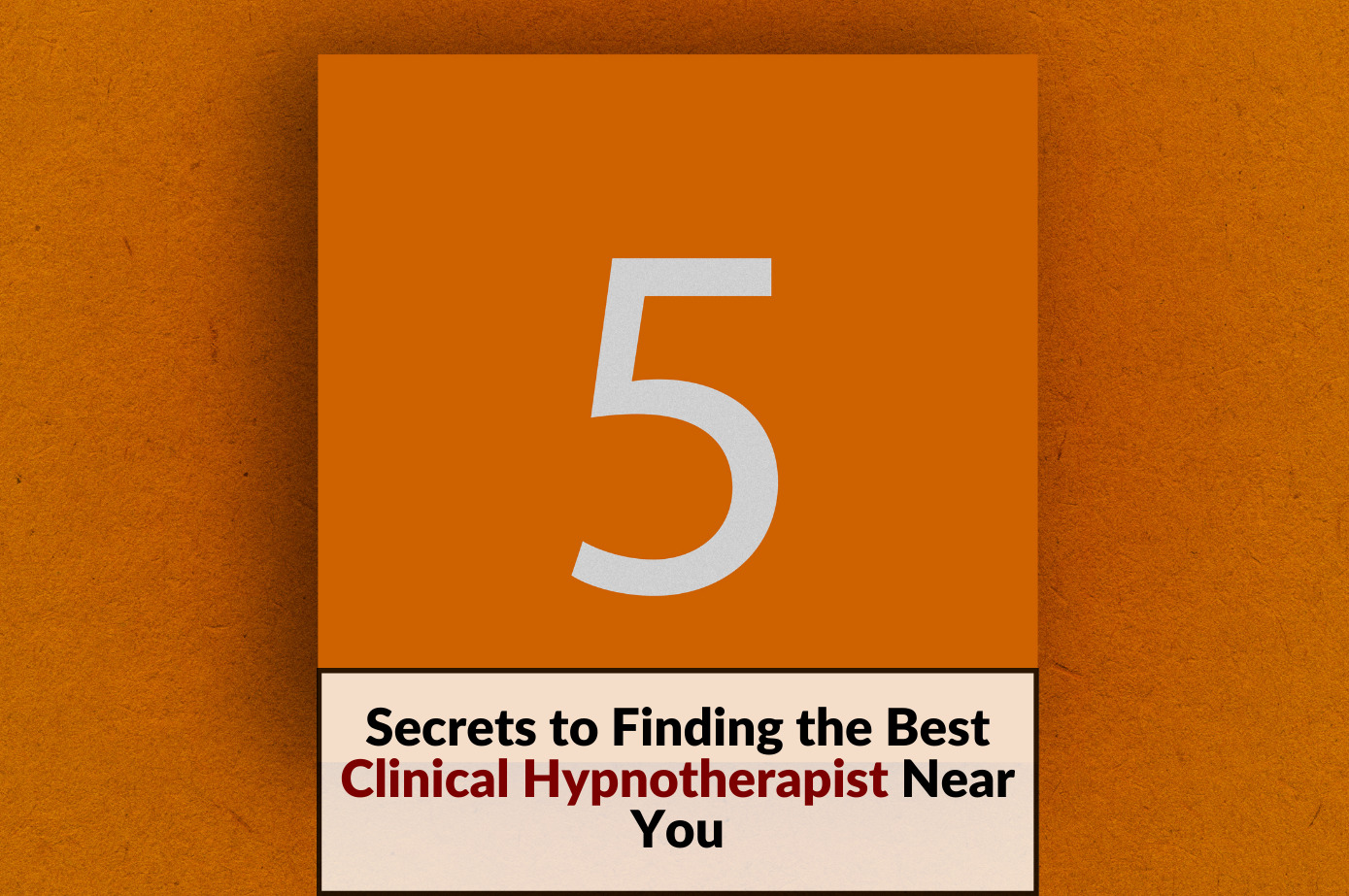Five Secrets to Finding the Best Clinical Hypnotherapist Near You
Introduction
Are you intrigued by hypnotherapy and its potential to help you achieve your goals or conquer challenges? Finding the right clinical hypnotherapist is crucial for a successful experience. Here are five secrets to assist you in finding the best clinical hypnotherapist near you and unlocking the benefits of hypnotherapy.
1. Understanding the Qualities of a Good Hypnotherapist
Before embarking on your search for a hypnotherapist, understanding the key qualities of a good hypnotherapist is crucial. A reputable hypnotherapist in Edmonton should possess proper training and certification in hypnosis and psychotherapy, along with certain essential qualities, including:
Professionalism and Ethical Standards
-
- Maintain high ethical conduct and professional behavior.
Effective Communication Skills
-
- Engage actively, conveying thoughts with clarity and attentiveness.
Hypnotherapy Skills and Techniques
-
- Master diverse hypnotherapy techniques for optimal client outcomes.
Empathy and Emotional Intelligence
-
- Demonstrate empathy, relating to clients’ emotions and experiences.
Flexibility and Adaptability
-
- Be adaptable, tailoring the approach to match each client’s requirements.
Patience and Perseverance
-
- Demonstrate patience, allowing clients to progress at their pace.
2. Spotting Hypnotherapist Red Flags
Be aware of any red flags because hypnosis involves a high level of trust and vulnerability from the client, and there is potential for misuse or abuse of this trust. Red flags to watch out for:
Unverified Credentials
-
- Ensure the hypnotherapist has proper certification.
Reluctance to Share Feedback
-
- Be wary if they won’t provide references or testimonials.
Overpromising Results
-
- Watch for exaggerated claims about hypnotherapy’s effectiveness.
Pressure for Long-Term Commitments
-
- Avoid being coerced into extended packages.
Beyond Expertise
-
- Confirm they only treat within their specialized area.
Communication Red Flags
-
- Watch for lack of transparency or responsiveness.
Boundary Respect
-
- Ensure they maintain professional boundaries.
3. Conducting Thorough Research and Check Reviews
Start by conducting thorough research on clinical hypnotherapists in your area. Look for reviews and testimonials from previous clients, providing insights into the therapist’s abilities and approach. Online platforms and directories can be valuable resources for gathering this information.
4. Taking Advantage of Free Consultations
Many hypnotherapists offer free consultations, providing an excellent opportunity to ask questions and discuss your concerns. Use this time to assess the therapist’s communication style and approach. Feeling at ease and comfortable with your hypnotherapist is crucial for a successful hypnotherapy journey.
5. Finding the Right Fit for You
Trust your instincts and prioritize a hypnotherapist with whom you feel a strong personal connection. Establishing a good rapport is pivotal for a successful hypnotherapy experience. A strong connection between you and your hypnotherapist can significantly enhance the effectiveness of the sessions.
Conclusion
These indicators are vital for clients to consider when selecting a hypnotherapist. By applying these five secrets, you’ll be on the right track to finding the best clinical hypnotherapist near you. Hypnotherapy can be a transformative tool for personal growth and healing. Choosing a skilled and compassionate hypnotherapist in Edmonton is key to overcoming challenges and achieving desired outcomes. Remember, the collaboration between you and your hypnotherapist is vital for a successful hypnotherapy journey.
- Mayo Clinic – Hypnotherapy Overview: Mayo Clinic provides an informative overview of hypnotherapy, including its benefits, applications, and considerations. This reputable source offers valuable insights for those seeking to understand more about the practice.
- Psychology Today – The Science of Hypnosis: Explore the science behind hypnosis with this article from Psychology Today. Delve into the psychological mechanisms that underlie hypnotherapy and gain a deeper understanding of how it works.
- WebMD – Hypnotherapy for Health and Wellness: WebMD presents a comprehensive guide on how hypnotherapy can benefit health and wellness. Learn about its applications for stress reduction, pain management, breaking bad habits, and more.
- American Psychological Association – The Truth About Hypnosis: The American Psychological Association offers an authoritative perspective on hypnosis, addressing common misconceptions and highlighting its effectiveness as a therapeutic tool. This source provides valuable insights from psychological professionals.
- Harvard Health Publishing – Mind-Body Medicine: Explore the intersection of mind and body health with this article from Harvard Health Publishing. Discover how techniques like hypnotherapy can contribute to overall well-being and enhance the mind-body connection.
Clinical hypnotherapy has shown to be effective in addressing a wide range of concerns, and success rates can vary depending on the individual and the issue being treated. For many people, hypnotherapy can lead to significant improvements in areas such as smoking cessation, weight management, stress reduction, and phobia elimination. Success rates can be high when the individual is motivated, committed to the process, and works with a qualified and experienced hypnotherapist. It’s important to note that the effectiveness of hypnotherapy can also depend on the specific techniques used and the compatibility between the therapist and the client.
Hypnotherapy can be considered controversial by some due to misconceptions and concerns related to the practice. One common misconception is the fear of losing control while under hypnosis, which is not the case. Clients remain in control and cannot be made to do anything against their will.
Another concern is the potential for false memories to be created during hypnotherapy sessions, although this is rare and depends on the therapist’s approach. Additionally, the portrayal of hypnosis in popular media has contributed to misunderstandings.
To address these concerns, it’s crucial to seek hypnotherapy services from qualified and ethical practitioners who adhere to professional standards and prioritize the well-being of their clients. Properly conducted hypnotherapy sessions are safe and can be highly effective in addressing various issues.
We suggest you follow these steps:
- Explore Registered Hypnotherapists: Search by location or name to find accredited hypnotherapists.
- Check Accredited Register: Ensure the Hypnotherapist is accredited and in good standing with a regulated society, indicating high standards.
- Seek Recommendations: Ask for referrals from trusted sources.
- Interview Hypnotherapists: Discuss your needs to assess their suitability, utilize the free consultation calls, if offered.
- Consider Specialization: Opt for a hypnotherapist specializing in your concern.
- Review Feedback: Check client reviews for insights.
The effectiveness of hypnotherapy isn’t about finding the “best” hypnotherapist, but about finding the right connection. Each person is unique, and their response to hypnosis varies. Success in hypnotherapy depends on the rapport and understanding between the client and the hypnotherapist. Embracing hypnosis requires a level of trust and a willingness to collaborate toward specific goals. Much like establishing trust with a wellness practitioner such as a massage therapist or acupuncturist, the effectiveness of hypnotherapy is built on this personalized and empathetic connection.
Even the best hypnotherapist may find it challenging to induce a hypnotic state if there’s a lack of rapport, client readiness, or other crucial factors. Establishing a strong connection is vital—similar to the relationship with a counsellor—ensuring you’re at ease and ready for the experience. A hypnotherapist should possess skills akin to a counsellor, creating a comforting, non-judgmental, and safe space. They offer an open ear and unconditional positive regard, crucial for facilitating the hypnotic journey. The success of hypnotherapy significantly relies on this client-centred approach, where trust and understanding pave the path toward achieving mutually defined goals.
Our Experienced Practitioners:
Anjali Nagda 🇬🇧 🇮🇳
Anjali Nagda has been working as a Registered Clinical Hypnotherapist with an extensive academic background in Clinical Psychology, advocating for the powerful potential of utilizing the subconscious mind. Over the past year, Anjali has been navigating the evolving scope of counseling in Alberta, registering herself as a Registered Clinical Counselor with the British Columbia Association of Clinical Counsellors (BCACC) and as a Counseling Therapist with the Association of Counseling Therapists of Alberta (ACTA). Her affiliation with additional regulatory bodies is underway, especially now that clinical counseling can be directly billed.
Anjali combines her expertise as a Registered Clinical Hypnotherapist and a Registered Clinical Counselor to offer integrated services as a Clinical Counseling Hypnotherapist. This dual approach empowers her to work with both the conscious and subconscious minds of her clients. She supplements various conscious therapeutic techniques such as Cognitive Behavior Therapy (CBT), Dialectical Behavior Therapy (DBT), and Rational Emotive Behavior Therapy (REBT), to name a few, which help individuals recognize and change negative thought patterns and behaviors, manage painful emotions, decrease conflict in relationships, and transform irrational beliefs into rational ones. These techniques are particularly effective for treating anxiety, depression, emotional dysregulation, anger, guilt, and unhealthy dependency.
Under hypnotherapy, Anjali employs techniques such as JPMR (Jacobson’s Progressive Muscle Relaxation), Guided Visualizations, Regression Therapy, Parts Integration Therapy, Behavioral Hypnotherapy, Analytical Hypnotherapy, and Inner Child Therapy, among others, to support clients with psychological trauma, specific fears, phobias, anxiety, sleep issues, and more.
Anjali’s invaluable experience at a De-addiction and Rehabilitation Center has given her the opportunity to work closely with individuals grappling with addiction. She focuses on identifying and addressing the underlying triggers that contribute to addictive behaviors, helping clients achieve a natural state of mindfulness and emotional regulation. By incorporating techniques such as Age Regression and Parts Therapy, Anjali empowers her clients to replace their dependency on substances with healthier coping mechanisms and a renewed sense of self-worth.
Anjali’s role has been evolving as her stay in Canada lengthens, driven by her dedication to supporting her clients to the best of her abilities. By combining Clinical Hypnotherapy and Clinical Counseling, she offers a holistic approach not commonly found in the Edmonton market. This unique service allows her to reach more individuals who previously faced barriers due to billing issues.
Anjali’s dedication to her clients’ well-being, combined with her expertise in both Clinical Hypnotherapy and Clinical Counseling, makes her a compassionate and effective guide on their journey towards transformation and healing. Her hard work behind the scenes ensures she can now support a broader range of clients through direct billing, welcoming those who were unable to access her services earlier.
Education:
- Post-Graduate Diploma in Clinical and Applied Hypnotherapy
- Masters in Clinical Psychology
- B.A. Psychology, Journalism, English Literature
Licensure:
- Registered Clinical Counselor, British Columbia Association of Clinical Counsellors (BCACC)
- Counseling Therapist, Association of Counseling Therapists of Alberta (ACTA)
- Registered Clinical Hypnotherapist (RCH), Canada Association Of Counselling Hypnotherapists And Educators (CACHE)
- Certified Hypnotherapist (CH) – National Guild of Hypnotists
Fluency: 🇬🇧 – English | 🇮🇳 – Hindi, Gujarati (fluent); Bengali, Punjabi (conversational)

Anjali Nagda 🇬🇧 🇮🇳
Hypnotherapy
Anjali Nagda has been working as a Registered Clinical Hypnotherapist...





